#Les Mystère Des Voix Bulgares
Explore tagged Tumblr posts
Text
Bulgarian Music in Studio Ghibli films
”Myth has it that Orpheus was born in what is now Bulgaria. It seemed to be fact, not myth, that his daughters are still singing there”
These words were written by the New York Times in the remote 1963 — the year in which the largest Bulgarian folk ensemble crossed the Iron Curtain to conquer an entire continent with its cosmic art.
The 1975 release of Le Mystère des Voix Bulgares, a compilation album of modern arrangements of Bulgarian folk songs, further popularized Bulgarian music, and in 1977, a vinyl record featuring the folk song “Izlel ye Delyo Haydutin” (Eng: Come out rebel Delyo) began its journey aboard the Voyager 1 and Voyager 2 spacecrafts.
From this point on popularity from the West spread to the East, and Bulgarian folk music made it to the entertainment industry, including legendary Japanese anime films, like the cult cyberpunk “Ghost in the Shell” or the heartwarming Studio Ghibli features.
In this short article I write about two occasions of Bulgarian music playing in Studio Ghibli’s films.
The record that inspired the creation of “Only Yesterday”
“Only Yesterday” is a 1991 Japanese animated drama film written and directed by Isao Takahata, based on the 1982 manga of the same title by Hotaru Okamoto and Yuko Tone. Set in rural Japan, the film draws parallels with the peasant lifestyle present in Eastern Europe.
The original work is a compilation of short stories about 11-year-old Taeko’s daily life in 1966. Director Takahata had a hard time making it into a movie since the manga, told in the form of a memoir, has no plot to hold a feature. Together with producer Toshio Suzuki, they came up with the solution of bringing the narrator of the story, adult Taeko, into the movie. But there is a curious anecdote about how this idea came to mind.
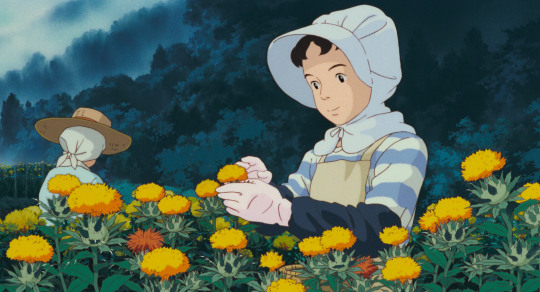
Taeko picks safflower as the Bulgarian song “Malka moma dvori mete” plays in the background. © Studio Ghibli
In a 2021 interview with students from Sofia University St. Kliment Ohridski, producer Suzuki recounts how a record of Bulgarian songs performed by the children choir “Bodra Smyana”, introduced to him by director Takahata, inspired the creation of the movie. Moved by the cosmic voices of the children, they decided to make “Only Yesterday” a musical. He also recalls what a tiring process it was to acquire the rights to the music, but if you’ve seen the movie, I am sure you will agree that it was worth it; the haunting, beautiful songs with the pastoral images of farmers picking flowers contribute to one of the greatest scenes created in cinema.
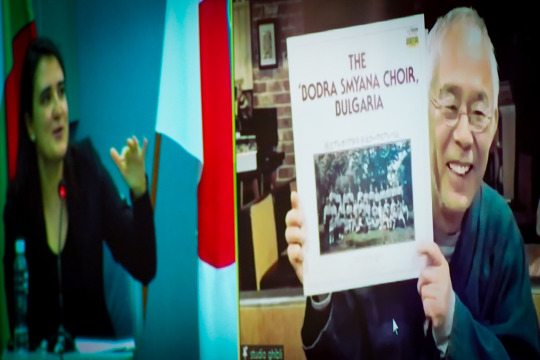
Producer Suzuki showing the record that inspired the creation of ”Only Yesterday”. Source: Studio Ghibli’s Twitter
In “Only Yesterday”, we can hear two songs from the album Bulgarian Polyphony I by Philip Koutev Ensemble. The upbeat “Dilmano Dilbero” [Eng. beautiful Dilmana] sets a happy mood as the protagonist gets changed and ready to go on the field. As the scene shifts and Taeko starts narrating a sad story about the girls in the past picking safflower with their bare hands, the song and mood shift as well.
While the first song has a fast rhythm, with lyrics about pepper planting that can also be interpreted figuratively, the second one, “Malka Moma Dvori Mete” [Eng., a little girl sweeps the yard], is a ballad about a young girl who is forced into marriage but has never known true love.
Both compositions sing about life-cycle events like marriage and the regular coming of the harvests, with lyrics perfectly fitting the setting and plot of the movie, which makes me wonder if the filmmakers chose them by chance or if they had someone translate the words.
Bulgarian Cosmic Voices Enchanting Howl
“Howl’s Moving Castle” is a 2004 Japanese animated fantasy film written and directed by Hayao Miyazaki, loosely based on the 1986 novel of the same name by British author Diana Wynne Jones. Set in a fictional kingdom the movie draws inspiration from various places in Europe. One of them being Bulgaria.
The story focuses on a young girl, named Sophie, magically transformed into an old woman, and a self-confident but emotionally unstable young wizard, Howl, living in a magical moving castle.
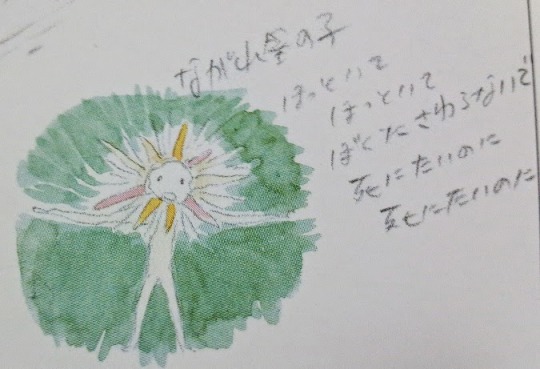
A sketch of a Star Child. Source: The Art of Howl’s Moving Castle
If you’ve seen the movie, you surely remember the scene when Madame Suliman ambushes Howl and tries to strip him of his magic powers. Star Children encircle him and his companions; their shadows grow big, dark and intimidating. They start dancing and chanting unintelligible magic words and are almost successful in their devilish act.
This scene, together with the music played in the background, have been a favourite of many fans of the film. Some even recount it giving them nightmares when they were children.
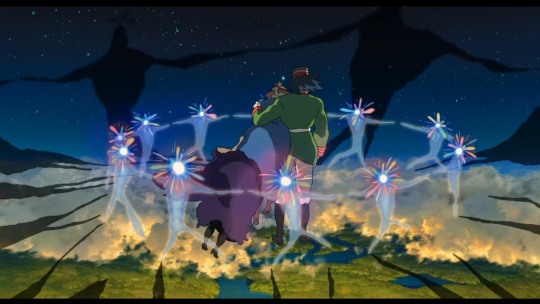
Star Children encircle Howl in an attempt to strip him of his magic powers. © Studio Ghibli
It turns out, however, that these aren’t any incantations, but the lyrics of a folk song. In Bulgarian. And a love song! Contrary to popular belief, the lyrics have nothing to do with magic and are actually about a boy taking his sweetheart, Dona, to the market to buy her new clothes. The excerpt used in the movie is very short and a bit altered from the original, but the words used go like this: Trendafilcheto, kalafercheto, Done mamino, translated as “the rose, the costmary, my darling Dona”.
I am planing a follow up article where I will post the translated lyrics together with a brief explanation on how they are related to the movies.
If you want to comment on or add something, I would love to hear!
Source
#studio ghibli#only yesterday#howls moving castle#Le Mystère des Voix Bulgares#bulgarian folklore#bulgaria#toshio suzuki#hayao miyazaki#isao takahata#bulgarian music in ghibli films#the boy and the heron#スタジオジブリ#ブルガリア#おもひでぽろぽろ#ハウルの動く城#宮崎駿#高畑勲#鈴木敏夫#bulgarian music
672 notes
·
View notes
Text

#japan band#david sylvian#holger czukay#ryuichi sakamoto#robert fripp#brian eno#bill laswell#le mystère des voix bulgares#alan stivell#koyaanisqatsi#ravi shankar#baraka ost#goran bregovic#philip glass#Powaqqatsi#Naqoyqatsi#Ron Fricke
7 notes
·
View notes
Text
youtube
Bulgarian State Television Female Vocal Choir - Erghen Diado (Song Of Schopsko) (1975)
19 notes
·
View notes
Video
youtube
(via The Voyage - Le Mystère Des Voix Bulgares (1992)
12 notes
·
View notes
Link
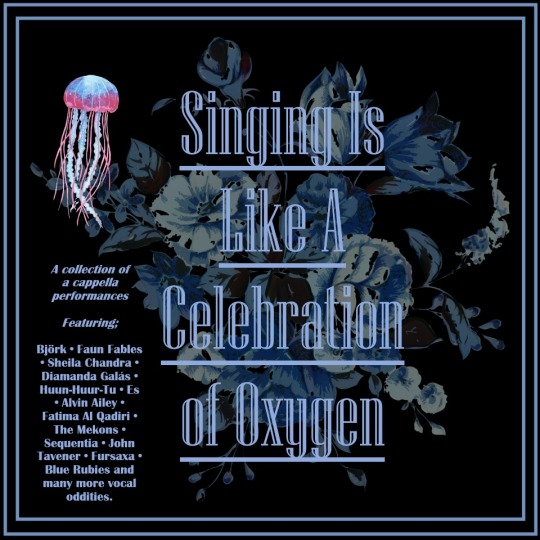
A primitive mix of largely a cappella recordings and other vocal oddities, all stitched together in a very simple way. It’s hopefully entertaining and challenging in equal measure, and something that I hope summons joy, fear, sadness and laughter!
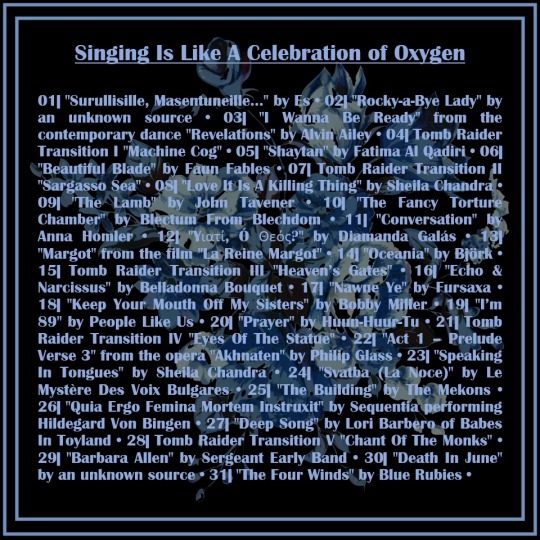
#a cappella#vocals#folk#avant garde#spoken word#classical#spoken poetry#bjork#Faun Fables#diamanda galas#john tavener#fatima al qadiri#sheila chandra#people like us#Le Mystère Des Voix Bulgares#the mekons#huun-huur-tu#Fursaxa#sequentia
2 notes
·
View notes
Text
good morning spotify, what polish hip hop do you have for me today

...

okay, fair
#daylist#that is pretty much the limit of my bulgarian music knowledge#apart from le mystère des voix bulgares of course#not that spotify knows that about me#music <3
0 notes
Text
if i go on your RYM page and the only bulgarian artist on there is Le Mystère des Voix Bulgares im ignoring all your other takes
1 note
·
View note
Text








2024 Skate Canada - October 25, 2024 Hana Yoshida → Temen Oblak (Dark Clouds) by Christopher Tin and Le Mystère des Voix Bulgares, choreographed by Benoît Richaud 📸 Mathieu Belanger for AFLO
#hana yoshida#figure skating#fs#skate canada#skate canada 2024#sc#sc 2024#grand prix series#grand prix series 2024#gp#gp 2024#season: 2024 2025#this is becoming a series
45 notes
·
View notes
Text
Author Spotlight: Bam Stroker
Today, we're bringing you a special musical guest post from Bam Stroker, author of the current club read Rusalka. Read on to learn more about the music that inspired this erotic retelling of the slavic rusalka myth!
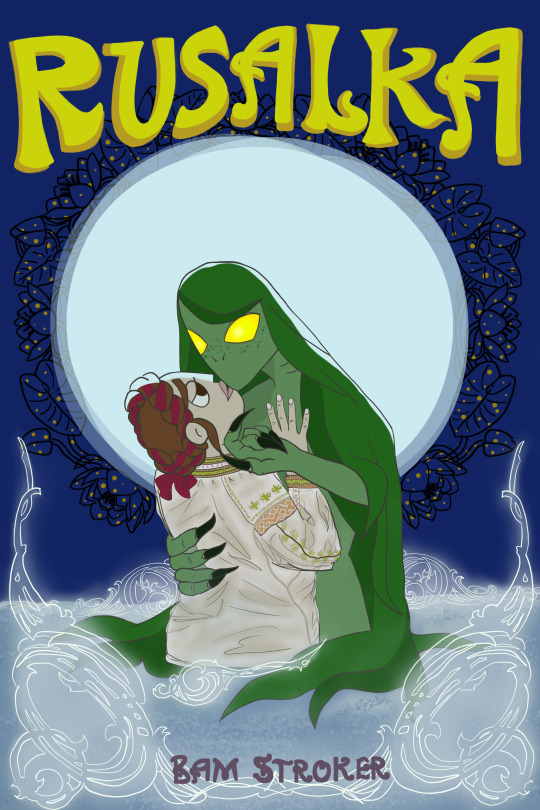
When you think of a lady in a lake, what comes to mind? For me, it’s the haunting trickster of the Rusalka!
Rusalka/Rusalki folklore exists in a pretty far reach, and the folklore for them is fascinating. Most folks will call them the “slavic mermaid”, but that’s not quite right. These ladies do not have fish tails! They hold a history much closer to nixie and nymphs, tied to the land. Until later in time they became associated with women who met their untimely deaths. Usually, by their own doing after losing the love of a man. Where they would then become haunting spirits that would seduce, trick, and drag anyone who dared come by their dwellings to a watery grave.
I first heard about them through the song Rusalka, Rusalka/ Wild Rushes by the Decemberists. When I listened to it, I was absolutely possessed to write a story where a woman runs to the lady of the lake, and instead of death finds love. It’s a setup we all know so well by now, of the historical lesbian gets hitched to a man and runs away to escape it all. And there have been plenty of historical lesbian stories where that escape is usually of the death variety.
Rusalka is a love letter to the complex history of Rusalki, and the stories we have been told about lesbians in history. For once, they both get a fairytale happy ending.
Music is a huge inspiration to me as a writer, especially of the folk variety, and while writing Rusalka I had many different songs on loop throughout the process. The first one is that Decemberists song:
Rusalka, Rusalka / Wild Rushes
While reading the story, music is very present with Sasha singing to the lady of the lake, earning the loving nickname of “Handsome songbird” from her smitten monster. One of the songs hinted at is from the opera Rusalka by Antonín Dvořák. For any Hans Christian Anderson fans out there, you’ll notice the plot of it is very familiar.
Song to the Moon - Rusalka Opera by Antonín Dvořák
Rusalka: “Song to the Moon”
When it comes to folk songs about Rusalki, Kitka’s The Rusalka Cycle: Songs Between Worlds album truly is an amazing inspiration. I’m still on the hunt for Rusalka folk songs, so if you happen to know of any I would be so excited to hear them. In the meantime, here’s a song to set the mood of Sasha’s mad dash to the lake at the start of the story.
To the Lake - Kitka
As far as other music, the songs I had on loop while writing were folk songs from different areas of the region. Le Mystère des Voix Bulgares, volume III, from The Bulgarian State Television Female Choir has got to be the most on loop music of them all though. I can almost hear them in my sleep at this point!
Here are some of those below:
Svatba (The Wedding) - Bulgarian State Television Female Choir
Solo Gousli - Stars of St. Petersburg
Kukułeczka - Mazowsze
Two Guitars - Andreyev Balalaika Ensemble
Echo of the steppes - Ukrainian Bandurist Ensemble
Whether you want to talk about monster folklore, monster fuckery, or have any monster folk songs recs, you can find Bam Stroker on their tumblr! Or if you’d like to peruse their erotic tomes, you can find them on itchio ✨💀✨
#wlw books#booklr#lgbt books#book recs#sapphic books#diverse books#fantasy#paranormal#rusalka#bam stroker#music
29 notes
·
View notes
Text
From Dreams on Ice practices
Kaori's new SP is to Concierto del Angel (Piazolla).
We have a tango Kaori, I repeat we have tango Kaori choreographed by Rohene Ward.
Rinka SP should be Moonlight Sonata (Rinka's love of warhorses strikes again). FS is Maria de Buenos Aires.
Hana Yoshida once again with the good music choice skates her SP to Temen Oblak (Dark Clouds by Christopher Tin feat Le Mystère des Voix Bulgares)
19 notes
·
View notes
Text
youtube
good morning lislten to Polegnala E Pschenitza (Harvest Chant From Thrace) from LE MYSTÈRE DES VOIX BULGARES. NOW!!
52 notes
·
View notes
Text




Record Label History: 4AD Records (CAD 602)
Le Mystère Des Voix Bulgares
Le Mystère Des Voix Bulgares (1986)
6 notes
·
View notes
Text
today's album of the day is Le Mystère des Voix Bulgares, Vol. 2 by Bulgarian State Television Female Choir
4 notes
·
View notes
Text


In 1986 4AD signed and reissued the album ‘Le Mystère Des Voix Bulgares’ by the Bulgarian State Television Female Vocal Choir. Ivo Watts-Russell called this album “a highlight of my life, my career.” This album is also credited as inspiration for the soundtrack of The Ghost in the Shell.
33 notes
·
View notes
Text
VAST - 25th Anniversary

Visual Audio Sensory Theater is the debut album by the band VAST, released on April 28, 1998 by Elektra Records. The album mixed samples of Benedictine monks of the Abbey of Saint-Maur and Le Mystère Des Voix Bulgares, with an 18-piece orchestra, guitars, and electronics.
In 25 days VAST'll be 25-years-old! 😱
10 notes
·
View notes
